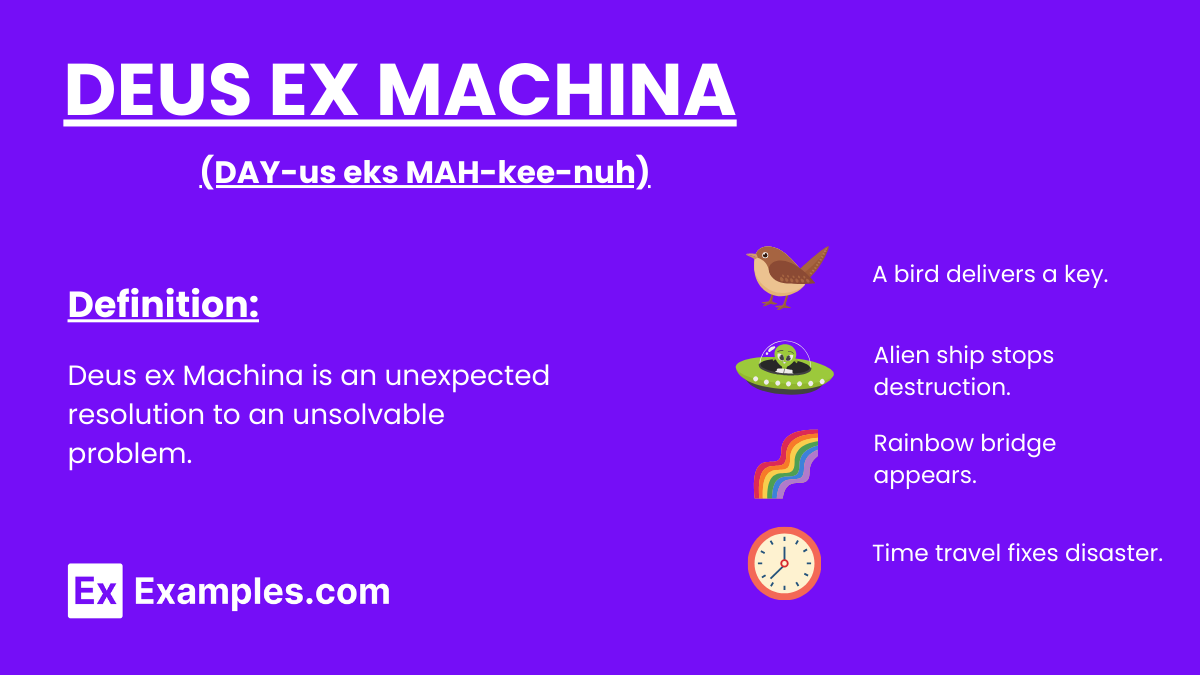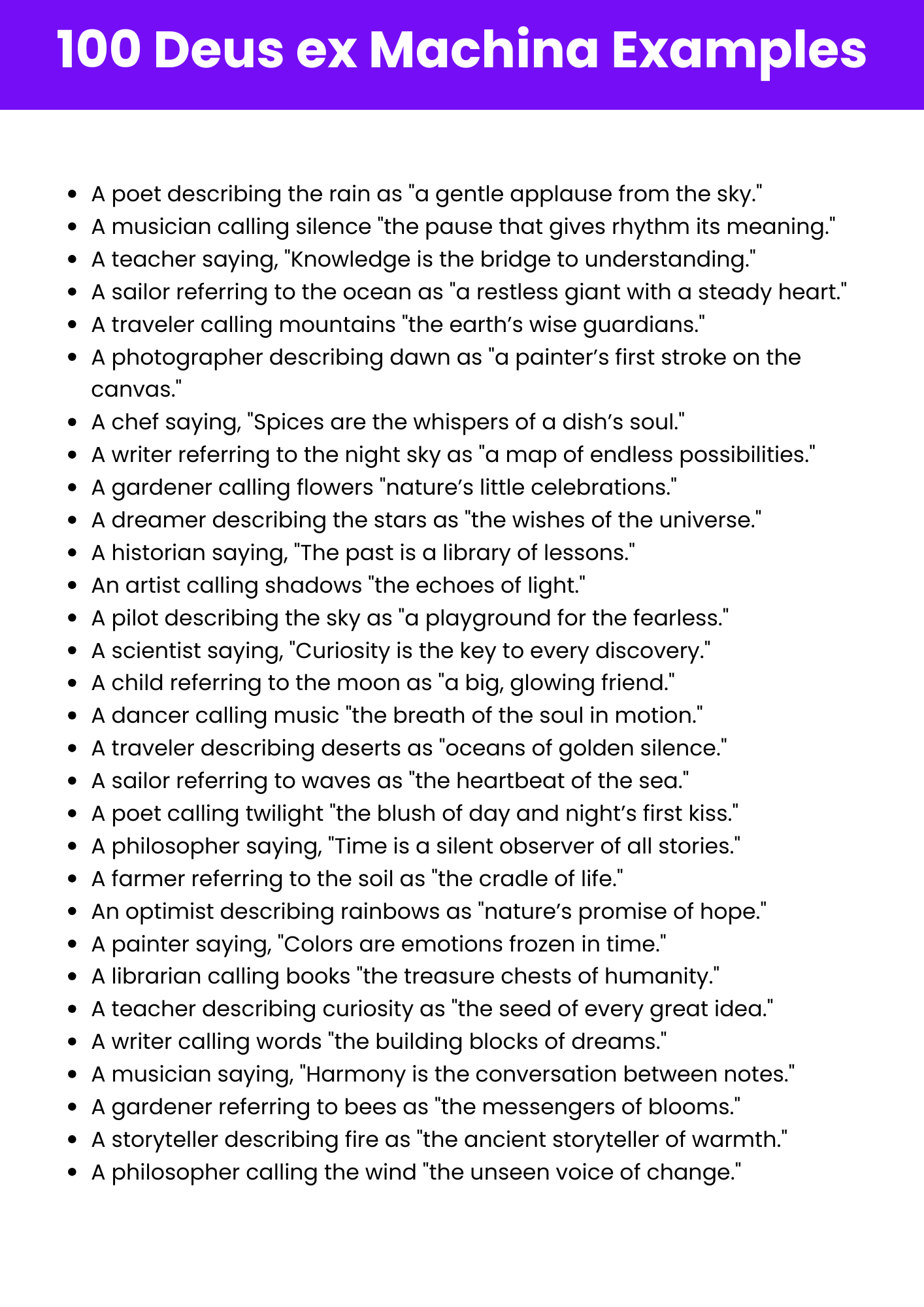Deus ex Machina
What is Deus ex Machina? – Definition
Deus ex Machina is a plot device where an unexpected power or event suddenly resolves a seemingly unsolvable problem in a story, often used to bring about a quick or convenient conclusion.

Generated Deus ex Machina Examples

Download Deus ex Machina Examples
Enhance your understanding with our comprehensive PDF guide.
Download PDFExamples of Deus ex Machina
- A superhero unexpectedly arrives to save the day at the last moment.
- A divine being descends from the heavens to resolve the main conflict.
- A previously unmentioned ship arrives to rescue stranded characters.
- A character suddenly remembers a crucial piece of information that solves everything.
- An invention miraculously works just in time to save lives.
- An army appears out of nowhere to defeat the antagonist.
- A magical object is discovered to stop a catastrophic event.
- Time travel is introduced to fix all prior mistakes.
- A tsunami conveniently washes away the enemy forces.
- A fire breaks out at the exact moment needed to destroy the villain’s plans.
- A character unexpectedly recovers from a fatal injury without explanation.
- A storm conveniently delays the enemy’s attack.
- Lightning strikes and destroys the antagonist’s hideout.
- A stranger suddenly appears to reveal the truth and clear the protagonist’s name.
- A bridge miraculously collapses, blocking the antagonist’s escape.
- The antagonist is accidentally hit by a falling object at the perfect moment.
- A miraculous cure is found for a deadly disease in the final act.
- Animals in the forest rally to protect the protagonist.
- An unknown benefactor pays off the protagonist’s debts at the last minute.
- A hidden document is revealed to save the protagonist in court.
- A game-winning goal is scored by an unlikely player with seconds left.
- A sudden rainstorm helps the protagonist escape pursuit.
- An unexplained rocket launch prevents an impending disaster.
- A comet’s sudden appearance distracts the enemy at a critical moment.
- Authorities arrive just in time to arrest the villain.
- A hidden weapon in the protagonist’s kitchen saves them during an attack.
- An alarm sounds, alerting the heroes to a hidden threat.
- A bus arrives to help stranded characters escape danger.
- The sun rises just in time to stop vampires from attacking.
- A politician unexpectedly passes a law that resolves the main conflict.
Types of Deus ex Machina
Divine Intervention
A deity or higher power directly resolving the conflict.
- “A god appears and saves the protagonist from disaster.”
- “A miracle occurs, healing everyone at the last moment.”
- “An angel descends to provide the solution.”
- “A divine weapon destroys the antagonist.”
- “A prophecy is fulfilled unexpectedly, resolving all issues.”
Sudden Rescue
A character or force unexpectedly saves the day.
- “A rescue ship appears to save the stranded crew.”
- “An unknown ally defeats the antagonist at the critical moment.”
- “A team of experts arrives just in time.”
- “A helicopter appears to airlift the characters to safety.”
- “Reinforcements arrive and change the tide of battle.”
Convenient Object
An object suddenly appears and solves the problem.
- “A magical artifact is discovered just in time.”
- “A hidden weapon in the room defeats the enemy.”
- “A bag of money saves the protagonist from debt.”
- “A star map conveniently shows the way to safety.”
- “An advanced gadget neutralizes the villain’s plan.”
Natural Event
A natural phenomenon resolves the conflict.
- “A sudden storm disperses the enemy forces.”
- “An earthquake prevents the antagonist’s escape.”
- “A river floods, halting the enemy’s advance.”
- “The sunrise turns vampires to ash.”
- “Lightning strikes and destroys the villain’s weapon.”
Hidden Knowledge
A sudden revelation or discovery resolves the plot.
- “A forgotten diary reveals the solution.”
- “A hidden document proves the protagonist’s innocence.”
- “A scientific breakthrough neutralizes the danger.”
- “A character recalls vital information at the last moment.”
- “A map leads the heroes to safety.”
Technological Solution
A new invention or technology resolves the issue.
- “A hacker disables the antagonist’s plans.”
- “An app reveals the villain’s location.”
- “A satellite intercepts and prevents a missile strike.”
- “A robot arrives to save the trapped characters.”
- “A surveillance system exposes the antagonist’s secrets.”
How to Identify and Understand Deus ex Machina?
Recognizing Deus ex Machina involves spotting unexpected plot resolutions that may lack prior setup and are introduced to resolve conflicts.
- Look for sudden and unanticipated events that resolve the conflict.
- Identify if the resolution is introduced without prior foreshadowing or buildup.
- Examine whether an external force, like a god or natural event, resolves the problem.
- Determine if the resolution feels out of place or too convenient in the narrative.
- Analyze its impact on the story’s tone and whether it disrupts logical progression.
How to Use Deus ex Machina Effectively?
Using Deus ex Machina effectively involves ensuring it enhances the story’s theme or creates a meaningful resolution.
- Integrate subtle foreshadowing to make the resolution feel less abrupt.
- Use it sparingly and only when it aligns with the story’s themes or messages.
- Consider its placement carefully to avoid disrupting the story’s flow.
- Ensure the Deus ex Machina resolution contributes to character development or closure.
- Balance its use with well-developed narrative elements to maintain audience engagement.
Other Examples of Deus ex Machina
Comedic Relief Resolution
A humorous or unexpected comedic moment resolves the central conflict.
- “A villain is incapacitated by slipping on a banana peel.”
- “The hero wins by making the villain laugh uncontrollably.”
- “An unexpected joke diffuses a deadly situation.”
- “A silly side character inadvertently foils the enemy’s plans.”
- “A prankster accidentally saves the day.”
Cosmic Irony
Fate or the universe intervenes to create an unexpected resolution.
- “The antagonist’s plan fails due to an inexplicable celestial event.”
- “A comet strikes the villain’s hideout, saving the hero.”
- “The universe seemingly aligns to thwart evil.”
- “A perfectly timed eclipse disorients the attackers.”
- “A meteor storm distracts the enemy fleet.”
Miscommunication Twist
A misunderstanding or accidental revelation unexpectedly resolves the conflict.
- “The villain reveals their plan by accidentally speaking into a live microphone.”
- “A secret conversation is overheard, exposing the antagonist’s betrayal.”
- “A mistaken text message alerts the hero to the villain’s location.”
- “A lie detector test unexpectedly exposes the antagonist.”
- “A wrong phone number connects the hero to vital intelligence.”
Sudden Alliance
A previously antagonistic or neutral character unexpectedly helps the protagonist.
- “A rival gang helps the hero to defeat a greater enemy.”
- “A former enemy provides a crucial piece of information.”
- “A neutral bystander intervenes to save the protagonist.”
- “A corrupt officer turns against their criminal ally to help the hero.”
- “An enemy soldier defects at a critical moment.”
Strategic Coincidence
A conveniently timed coincidence resolves the story’s tension.
- “A truck arrives just in time to block the villain’s escape.”
- “A lottery ticket blows into the hero’s hand, saving their finances.”
- “The hero stumbles upon the villain’s secret hideout while lost.”
- “A key witness miraculously survives an accident to testify.”
- “A phone call connects at the perfect moment to stop a disaster.”
Unexpected Reversal
A sudden and improbable change of fortune or decision that resolves the plot unexpectedly.
- “The antagonist unexpectedly decides to surrender and confess.”
- “A long-lost friend returns at the climax to save the day.”
- “The villain has a sudden change of heart and helps the hero.”
- “The rival team forfeits, declaring the hero as the winner.”
- “A sudden realization convinces the antagonist to undo their schemes.”
Explore Other Literary Devices
Elevate Your AP English Preparation
Unlock your potential with our comprehensive AP English exam preparation tools designed to help you excel.
- Extensive Question Bank: Access 900+ exam-like questions for both AP English Language and Literature.
- Expertly Crafted: Questions mirror the structure and difficulty of actual AP exams, ensuring relevant practice.
- Detailed Explanations: Understand your mistakes with clear, concise breakdowns of correct and incorrect answers.
- Personalized Learning: Tailor your study sessions with topic-specific tests and adaptive learning tools.
- Comprehensive Coverage: Master all aspects of the AP English curriculum with extensive guides and resources.
Frequently Asked Questions
-
What is Deus ex Machina?
Deus ex Machina refers to a plot device where a seemingly unsolvable problem is suddenly resolved by an unexpected intervention or event. -
Why is Deus ex Machina used in storytelling?
Deus ex Machina is often used to resolve complex or impossible conflicts, create surprising twists, or provide a dramatic conclusion. -
What are some examples of Deus ex Machina in literature?
Examples include the eagles rescuing Frodo and Sam in *The Lord of the Rings* or the Greek gods intervening in ancient plays. -
How does Deus ex Machina differ from foreshadowing?
Deus ex Machina is an unexpected resolution without prior hints, while foreshadowing subtly hints at future events or outcomes. -
Is Deus ex Machina considered a good plot device?
Deus ex Machina is often criticized for being unrealistic or lazy storytelling but can be effective if used creatively and sparingly. -
Can Deus ex Machina be used in modern films?
Yes, it is commonly used in modern films, such as a last-minute rescue or a previously unknown character solving the central problem. -
How can writers avoid overusing Deus ex Machina?
Writers can avoid overusing it by creating well-planned resolutions and ensuring any interventions are consistent with the story’s logic. -
What are common criticisms of Deus ex Machina?
Critics argue it can undermine plot credibility, disrupt narrative flow, and reduce character agency in resolving conflicts. -
What are examples of Deus ex Machina in mythology?
In Greek mythology, gods frequently intervened in mortal affairs, such as Athena aiding Odysseus in *The Odyssey*. -
What is the origin of the term Deus ex Machina?
The term originates from ancient Greek theater, meaning “god from the machine,” where gods were literally lowered onto the stage to resolve conflicts.

